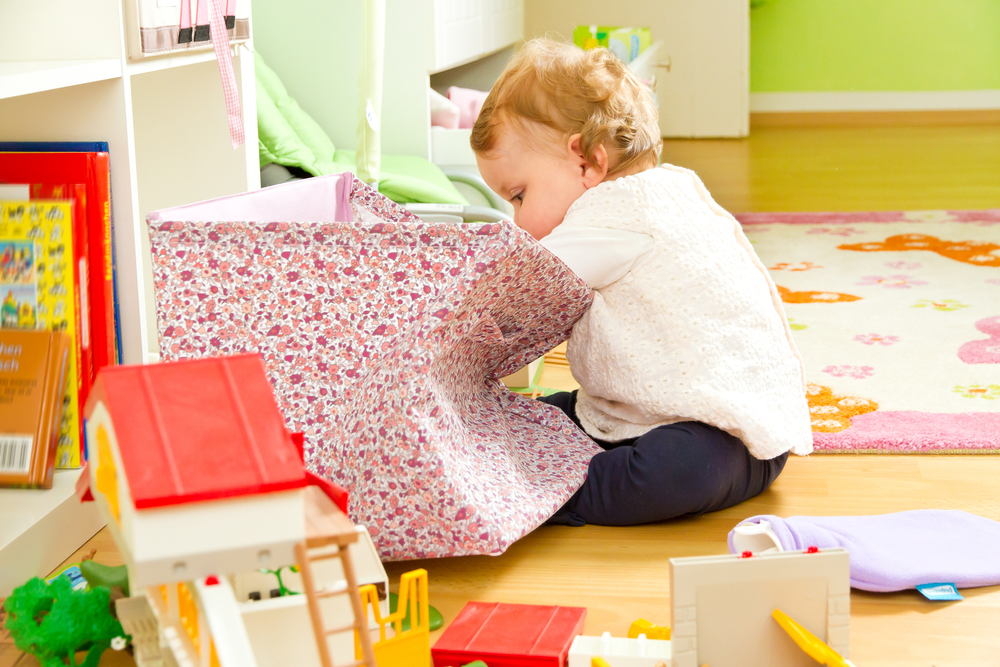Children aren’t born with Executive function skills “” they are born with the potential to develop them. By following the list of activities put forward by the Center on the Developing Child at Harvard University, you can help your 6 to 18-month-olds to develop memory, mental flexibility and self-control.
Development of executive function (EF) skills in early childhood is important for your toddler’s future life and learning. We present you the Executive Function Activities for 6 to 18-month-olds that can help your toddler develop memory, mental flexibility and self-control.
Executive functioning is a group of skills that helps children focus on multiple streams of information simultaneously and incorporates organized processes for goal-oriented behaviour. Executive processes are crucial for formulation of goals and strategies and some of its elements include: anticipation, goal selection, planning, self-regulation, mental flexibility and utilization of feedback. In addition, executive functions help with self-regulation, which refers to child’s capability of self-control.
Children aren’t born with Executive function skills “” they are born with the potential to develop them.
It is beneficial for children to exercise their developing skills through activities that foster creative play and social connection. Acquiring early foundations of executive functioning skills is one of the most important and challenging tasks of the early childhood years. It is important for children to have the right support and experience through middle childhood, adolescence, and into early adult life in order to successfully develop these capacities.
Here is a list of activities recommended by the Center on the Developing Child at Harvard University, that show certain aspects of executive functioning you can practice with your toddler at home.
Executive Function Activities for 6 to 18-month-olds:
- Peekaboo “” Hide-and-seek games like this exercise working memory, because they challenge the baby to remember who is hiding, and they also practice basic self-control skills as, in some variations, the baby waits for the adult to reveal him or herself. In other versions, the baby controls the timing of the reveal; this provides important practice regulating the tension around an expected surprise.
- Trot, Trot to Boston; This is the Way the Farmer Rides; Pat-a-Cake “” Predictable rhymes that end with a stimulating yet expected surprise are well-loved. Infants exercise working memory as they develop familiarity with the rhyme and practice anticipating a surprise, inhibiting their anticipatory reactions while managing high levels of stimulation.
Hiding Games
Hiding games are a great way to challenge working memory.
- Hide a toy under a cloth and encourage the infant to look for it. Once infants can find the toy quickly, hide it, show the child that you have moved it, and encourage him or her to find it. Make more moves to increase the challenge. As the child remembers what was there and mentally tracks the move, it exercises its working memory.
- Older infants may enjoy hiding themselves and listening to you search for them loudly while tracking your location mentally.
- You can also hide an object without showing an older infant where it is and then allow him or her to search for it. They will practice keeping track of locations they searched.
- Another challenging version of these games involves putting a set of cups on a turntable (or “lazy Susan”), hiding an object under a cup, then spinning the turntable. Hiding more than one object can also increase the challenge.
Imitation or Copying Games
Infants love to copy adults. When they imitate, they have to keep track of your actions, remember them, wait for their turn, and then recall what you did. While doing so, they practice attention, working memory, and self-control.
- These games have a variety of forms, from taking turns when making simple gestures (e.g., waving) to organizing toys in certain ways and asking children to copy you (e.g., placing toy animals in a barnyard), or building simple buildings by putting one block on top of another and sometimes knocking them down just to rebuild them.
- As infants’ skills improve, make the patterns they copy more complicated.
- Adults can also demonstrate ways of playing with toys, like making a toy horse gallop or rocking a baby doll. This introduces the concept of using toys as symbols for real objects.
Conversations
Simply talking to an infant is a wonderful way to build attention, working memory, and self-control.
- With younger infants, start by following the infant’s attention and naming aloud the things holding their focus. The infant will likely maintain his or her attention a little longer, practicing to actively focus and sustain attention.
- As infants get older, pointing out and talking about interesting objects or events can help them learn how to focus their attention on something the adult has identified. As babies learn language, they also develop their memory of what is said, eventually mapping words to objects and actions.
- Conversations in any language apart from your child’s native language are also helpful. It has been found that bilingual children of many ages have better executive function skills than monolingual children, so experience using an additional language is an important skill.
Resources for parents: Songs and games
www.piercecountylibrary.org/files/library/wigglesticklesall.pdf
www.turben.com/media-library/8702756_infanttoddlerplaybook.pdf
www.zerotothree.org/child-development/grandparents/play-0-12-mths-final.pdf





























